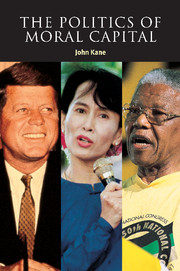Book contents
7 - Kennedy and American virtue
Published online by Cambridge University Press: 22 September 2009
Summary
Mythology, n.: The body of a primitive people's beliefs concerning its origin, early history, heroes, deities and so forth, as distinct from the true accounts which it invents later.
Ambrose Bierce, The Devil's DictionaryReflecting on the legacy of Vietnam in April 2000, twenty-five years after the fall of Saigon, Henry Kissinger wrote:
one of the most important casualties of the Vietnam tragedy was the tradition of American “exceptionalism.” The once near-universal faith in the uniqueness of our values – and their relevance round the world – gave way to intense divisions over the validity of those values and the lengths we should go to promote and defend them. And those schisms have had a profound impact on the conduct of American foreign policy ever since.
Kissinger claims that protest against the war rapidly turned into doubt about “American exceptionalism,” and soon into the conviction that the “ultimate cause of the crisis was not errors in judgment but moral rot at the core of American life.” Far from desiring an American victory in the war, the protesters sought an American defeat as “a desirable national catharsis.” A demoralized establishment, faced with radicals who “knew no limits” in their violent critique, found itself unable to vindicate the values on which American post-war policy had been based.
The implication of Kissinger's argument is that the unity of faith then lost was never recovered.
- Type
- Chapter
- Information
- The Politics of Moral Capital , pp. 180 - 199Publisher: Cambridge University PressPrint publication year: 2001

